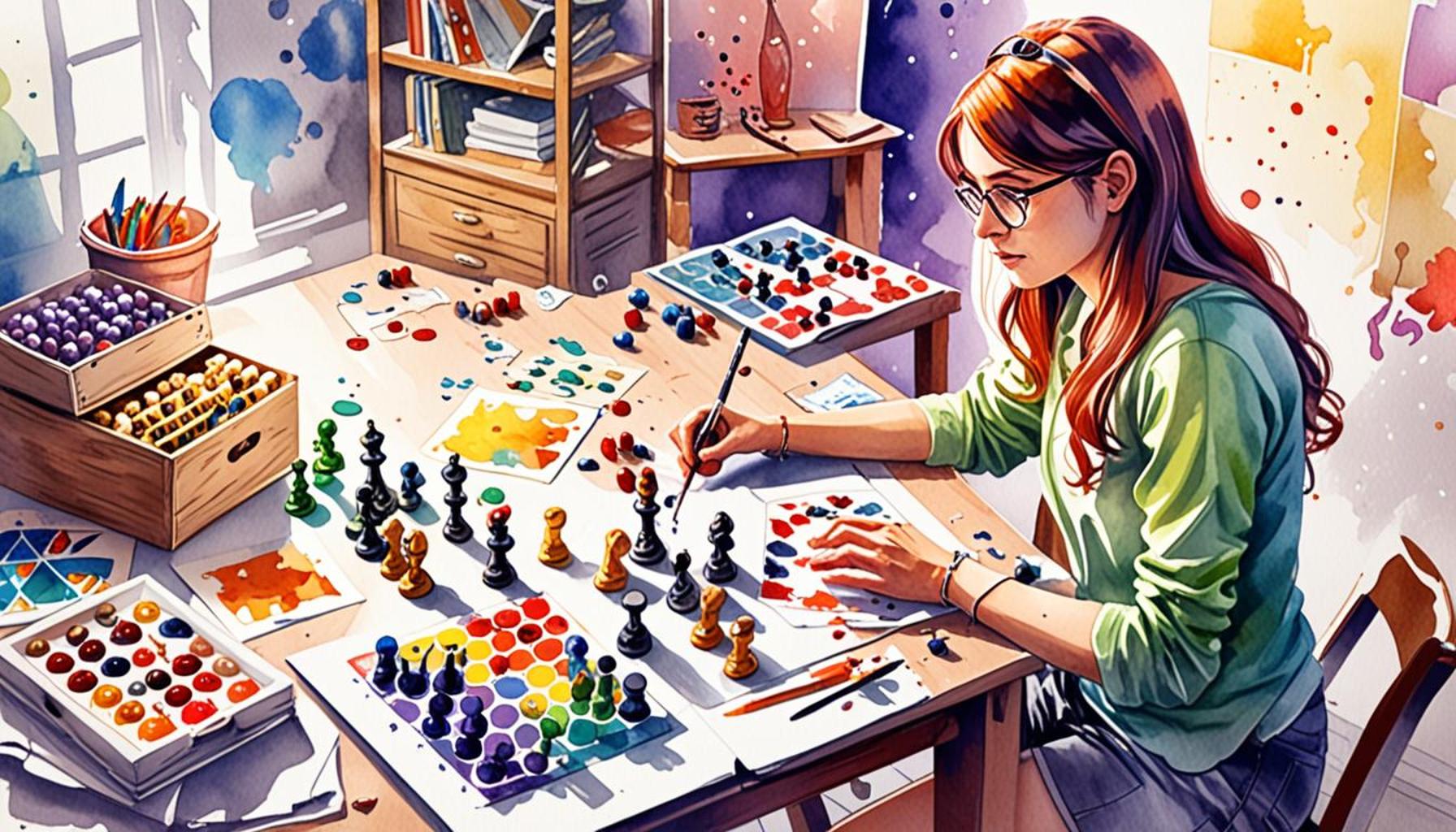Mind Games as Tools for Developing Problem-Solving Skills in Adolescents

Unlocking Potential Through Mind Games
In today’s fast-paced world, adolescents face challenges that require effective problem-solving skills. While technology often dominates their engagement, mind games offer a refreshing alternative that can significantly enhance cognitive development. These activities not only entertain but also cultivate essential life skills that are vital in both academic and personal spheres.
The Importance of Problem-Solving Skills
Adolescents need to navigate various problems in academics and personal life. Key benefits of honing these skills include:
- Improved Critical Thinking: Adolescents learn to analyze situations from multiple angles, which is particularly beneficial when faced with complex assignments or interpersonal conflicts. For example, a student working on a group project must consider various perspectives to devise a strategy that incorporates everyone’s ideas.
- Increased Creativity: Engaging with mind games encourages adolescents to generate innovative solutions to unexpected issues. This creativity can translate into artistic endeavors, unique problem resolution in science projects, and even fresh approaches to solving everyday challenges.
- Enhanced Decision Making: Mind games teach adolescents how to make informed choices based on logical reasoning rather than impulse. For instance, playing strategic board games like Risk can help players evaluate risks versus rewards, a critical skill when dealing with real-life decisions such as budgeting or selecting extracurricular activities.
Why Mind Games?
Mind games are perfect tools for adolescents due to their engaging nature and versatility. These games can include:
- Puzzles: Activities like Sudoku or crosswords challenge logical reasoning and pattern recognition. They also offer immediate feedback, allowing players to learn from their mistakes and improve over time. Many schools incorporate these games into their curriculum to make learning more engaging and fun.
- Strategy Games: Games like chess or Settlers of Catan foster long-term planning and foreseeing consequences. Chess, in particular, is renowned for enhancing cognitive skills, with several studies indicating improved IQ levels among regular players.
- Brain Teasers: Riddles and lateral thinking problems promote flexibility in thought, encouraging adolescents to think outside the box. Simple brain teasers can also be used in classrooms as warm-up activities to stimulate the mind before tackling more complex lessons.
As these adolescents engage with mind games, they embark on a journey that not only entertains but equips them with vital skills for the future. In a world that is becoming increasingly reliant on technology, balancing screen time with engaging mental exercises can play a crucial role in nurturing well-rounded individuals. By embracing mind games, adolescents can unlock their full potential and develop competencies that will serve them well into adulthood.
DIVE DEEPER: Click here to uncover the link between puzzles and early cognitive growth</p
The Mechanics of Mind Games: How They Foster Skill Development
Understanding the internal mechanisms of mind games is essential to appreciate their role in developing problem-solving skills among adolescents. These games stimulate cognitive functions, encouraging critical thinking and strategic planning in an engaging manner. When adolescents are drawn into the world of mind games, they are not merely participating in a pastime; they are actively honing skills that will benefit them throughout life.
Engagement and Motivation
One of the foremost advantages of mind games is their power to capture an adolescent’s attention. Unlike traditional learning methods, which may seem tedious or irrelevant, mind games offer an interactive and enjoyable way to practice critical skills. Adolescents often relate better to activities that are fun and competitive, leading to greater motivation to solve complex challenges. This level of engagement is crucial in a society where constant distractions, especially from technology, are rampant.
Development of Key Skills
To delve deeper into how mind games cultivate essential problem-solving skills, it’s worthwhile to examine the specific abilities that these games enhance. Here are some key areas:
- Logical Reasoning: Many mind games, from traditional board games to modern puzzles, require players to employ logic and reasoning. For instance, games like chess require players to not only plan their moves but also anticipate their opponent’s strategies, thereby sharpening their logical thinking capabilities.
- Analytical Skills: Mind games often present players with complex scenarios that require analysis and evaluation. Engaging in tasks such as solving riddles or completing brain teasers pushes adolescents to dissect problems and consider multiple potential outcomes before reaching a solution.
- Social Skills: Multiplayer mind games can foster teamwork and collaboration, essential aspects of effective problem-solving. By working together on strategy-based games, adolescents learn to communicate effectively, share ideas, and navigate differing opinions, skills that are vital in both academic settings and personal relationships.
- Patience and Perseverance: Solving challenging puzzles and games teaches adolescents the necessity of persistence. This patience is often transferable to other areas of their lives, promoting resilience when faced with obstacles or setbacks.
These elements work together to create a tapestry of cognitive growth that cannot be achieved through passive forms of entertainment. As adolescents engage with mind games, they build a toolkit of problem-solving strategies that can be applied to real-life situations, from academic challenges to personal decision-making scenarios.
Moreover, the variety of mind games available today—from digital apps to classic board games—ensures that there is something suitable for every interest and skill level. This accessibility encourages a diverse range of adolescents to immerse themselves in problem-solving activities, further reinforcing the idea that cognitive development need not be a chore. Instead, it can be a thrilling journey that prepares them for the complexities of adulthood.
| Category | Details |
|---|---|
| Critical Thinking | Mind games help enhance analytical skills by encouraging adolescents to evaluate scenarios and outcomes, fostering a mindset geared toward problem-solving. |
| Collaboration | Many mind games require teamwork, teaching adolescents the importance of communication and collaboration in tackling challenges together. |
Adolescents engaging in mind games not only stimulate their minds but also develop essential skills that will serve them well in their future endeavors. As they learn to navigate challenges and strategize solutions, these adolescents become more adept at recognizing problems and thoughtfully analyzing them. Research shows that playing strategy-based games can significantly improve cognitive abilities and enhance logical reasoning. Furthermore, the social dynamics involved in certain mind games present practical settings for adolescents to work collaboratively, reinforcing the value of teamwork. By sharing strategies and viewpoints, they sharpen their interpersonal skills while addressing complex problems. Thus, using mind games as tools presents an innovative approach to nurturing both intellectual and social growth in today’s youth, providing them with the skills necessary for lifelong success.
DISCOVER MORE: Click here to learn about the link between puzzle complexity and cognitive growth</p
Expanding Horizons: Diverse Applications of Mind Games
As the landscape of educational tools evolves, mind games are emerging as versatile instruments for fostering problem-solving skills in adolescents. Their applications stretch beyond pure entertainment, spanning various environments such as classrooms, after-school programs, and even family game nights. Understanding how these games can be utilized in different contexts demonstrates their profound impact on skill development across a wide array of settings.
Educational Environments
Incorporating mind games into educational curricula can transform traditional learning experiences. Teachers across the United States are increasingly recognizing the potential of using games to supplement classroom activities. For instance, games like brain teasers or logic puzzles can serve as engaging warm-up exercises, effectively reinforcing key concepts while making learning enjoyable. Additionally, platforms like Kahoot! have integrated game-based learning into teaching practices, allowing students to engage with academic material in a stimulating format. Research has shown that students who partake in these interactive activities demonstrate improved memory retention and problem-solving abilities, leading to enhanced academic performance.
After-School Programs
Beyond the classroom, after-school programs often leverage the engaging nature of mind games to create a supportive environment for adolescents’ growth. Programs that incorporate strategies like team-based challenges or escape room concepts encourage students to collaborate and think critically under pressure. This social aspect of problem-solving is particularly relevant for adolescents, as peer interaction plays a pivotal role in their cognitive and emotional development. Such environments allow players to experiment with different approaches to problem-solving, learning that multiple strategies can lead to successful outcomes while fostering a sense of community.
Therapeutic Uses
Moreover, mind games are also increasingly recognized for their benefits in therapeutic settings. For adolescents facing emotional or psychological challenges, mind games can serve as a safe outlet for exploring complex situations and emotions. Programs incorporating games like riddles or strategy-based board games can facilitate discussions about problem-solving strategies while simultaneously improving cognitive functioning. Mental health professionals often cite the effectiveness of these games in promoting resilience, as they afford adolescents the opportunity to reflect on their thought processes and develop coping mechanisms in a non-threatening environment.
Real-Life Applications: Beyond the Game
The skills honed through engaging with mind games extend into real-life applications that are critical for adolescent success. For instance, the strategic thinking cultivated in games like chess translates seamlessly into academic settings, where planning and foresight are necessary for effective project management. Similarly, adolescents who regularly engage in collaborative problem-solving games often find themselves better equipped to tackle group assignments or navigate social dynamics in diverse environments.
Additionally, the analytical skills developed through puzzles and mind games prepare adolescents for increasingly complex challenges in the workforce and beyond. As they learn to evaluate options and consider potential consequences in a gaming environment, they are simultaneously acquiring transferable skills that can enhance their employability in a competitive job market.
Ultimately, the adaptability and benefits of mind games confirm their status as indispensable tools in the development of essential problem-solving skills for adolescents. Whether it’s in educational settings, extracurricular activities, or therapy, the unique and engaging approach offered by these games ensures a lasting impact on young minds, preparing them for life’s myriad challenges.
DIVE DEEPER: Click here to discover more about puzzle complexity and cognitive growth
Conclusion: Harnessing the Power of Mind Games for Future Success
In a world where critical thinking and problem-solving are paramount, mind games have proven themselves to be invaluable tools for adolescent development. Their multifaceted applications in educational settings, after-school programs, and even therapeutic environments underscore their significance as catalysts for cognitive growth. Not only do these games entertain, but they also foster essential skills such as analytical thinking, team collaboration, and strategic planning.
The research backing the benefits of mind games suggests that adolescents engaged in these activities exhibit enhanced memory retention and improved academic performance. Moreover, the collaborative aspect of mind games encourages social interaction, vital for strengthening emotional intelligence. As participants navigate puzzles and challenges, they learn that there are often multiple solutions to a problem—an insight that extends far beyond the game board into real-life scenarios.
As we look to the future, it becomes clear that integrating mind games into various aspects of a young person’s life is not merely an innovative approach but a necessity. The skills developed through these games prepare them for the complexities of both higher education and an increasingly competitive job market. By adopting this approach, parents, educators, and community leaders can equip adolescents with the tools they need to thrive in an ever-evolving landscape. In short, the transformative power of mind games underscores their role as pivotal instruments in shaping capable, resilient, and successful individuals ready to tackle the world’s challenges.


